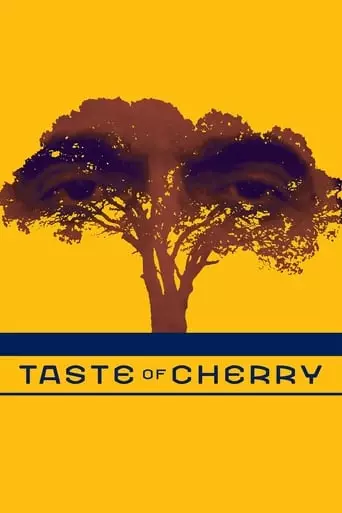A middle-aged Tehranian man, Mr. Badii is intent on killing himself and seeks someone to bury him after his demise. Driving around the city, the seemingly well-to-do Badii meets with numerous people, including a Muslim student, asking them to take on the job, but initially he has little luck. Eventually, Badii finds a man who is up for the task because he needs the money, but his new associate soon tries to talk him out of committing suicide.
Taste of Cherry is a 1997 Iranian film directed by Abbas Kiarostami, renowned for its minimalist style and profound exploration of existential themes. The narrative centers on Mr. Badii, a middle-aged man traversing the outskirts of Tehran in his Range Rover, seeking someone willing to assist him in ending his life. He offers a substantial sum to individuals who will ensure his body is buried after his death. Throughout the film, Badii encounters various individuals—a Kurdish soldier, an Afghan seminarian, and a Turkish taxidermist—each engaging in conversations that subtly challenge his decision. The film culminates with Badii preparing for his planned suicide, leaving the audience to ponder his fate.
Kiarostami’s direction is characterized by long, contemplative takes and naturalistic dialogue, creating a meditative atmosphere that encourages viewers to reflect on the film’s themes. The sparse narrative and open-ended conclusion invite multiple interpretations, prompting discussions about the value of life and the human condition. The film’s minimalist approach, focusing on a single character’s journey, allows for a deep exploration of existential questions without the need for elaborate backstories or plot developments.
Four Main Themes in Taste of Cherry
- The Value of Life:
- The film delves into the profound question of life’s worth, portraying Badii’s contemplation of suicide and his interactions with others who offer differing perspectives on existence. Through these encounters, the narrative explores the human tendency to seek meaning and purpose, even in the face of despair.
- Human Connection and Empathy:
- Badii’s dialogues with strangers highlight the innate human desire for connection and understanding. Despite their initial reluctance, the individuals he meets engage in conversations that reveal their own struggles and philosophies, underscoring the universal need for empathy and shared human experience.
- Existential Reflection:
- The film serves as a meditation on existential themes, prompting viewers to reflect on the nature of existence, the inevitability of death, and the search for meaning. Badii’s journey becomes a metaphor for the human condition, exploring the complexities of life and the choices individuals make in the face of mortality.
- The Role of Nature and the Environment:
- Nature plays a significant role in the film, symbolizing the beauty and simplicity of life. The titular taste of cherry serves as a metaphor for the simple pleasures that can make life worthwhile, suggesting that even in moments of despair, the natural world offers solace and meaning.
Impact of the Movie
Taste of Cherry received critical acclaim for its innovative storytelling and profound thematic exploration. It won the Palme d’Or at the 1997 Cannes Film Festival, solidifying Kiarostami’s reputation as a master filmmaker. The film’s minimalist style and open-ended narrative have influenced numerous filmmakers and continue to be subjects of academic study and discussion. Its impact extends beyond cinema, prompting philosophical debates about the nature of existence and the human experience.
7 Reasons to Watch Taste of Cherry
- Innovative Cinematic Technique:
- Kiarostami’s use of long, unbroken takes and naturalistic dialogue creates a contemplative atmosphere that immerses viewers in the protagonist’s journey. This minimalist approach allows for a deep exploration of themes without the need for elaborate plot devices.
- Profound Exploration of Existential Themes:
- The film delves into deep philosophical questions about the value of life, the inevitability of death, and the search for meaning, prompting viewers to reflect on their own existence and beliefs.
- Authentic Depiction of Human Connection:
- Through Badii’s interactions with strangers, the film portrays the universal need for empathy and understanding, highlighting the shared human experience and the impact of simple conversations.
- Symbolic Use of Nature:
- The film’s setting and the recurring motif of the taste of cherry serve as metaphors for the beauty and simplicity of life, offering a poignant reminder of the small pleasures that make life worthwhile.
- Critical Acclaim and Recognition:
- Winning the Palme d’Or at the 1997 Cannes Film Festival, the film has been lauded for its artistic achievement and continues to be studied and discussed in film circles worldwide.
- Influential Filmmaking:
- Taste of Cherry has influenced numerous filmmakers with its minimalist style and thematic depth, inspiring a generation of directors to explore existential themes through subtle storytelling.
- Thought-Provoking Narrative:
- The film’s open-ended conclusion and lack of traditional narrative structure encourage viewers to engage in personal reflection and interpretation, making it a deeply individual experience.
How Will You Feel After Watching Taste of Cherry?
After watching Taste of Cherry, you will likely feel a profound sense of introspection and contemplation. The film’s exploration of existential themes and the human condition prompts viewers to reflect on their own lives, values, and beliefs. The minimalist storytelling and open-ended narrative may leave you with lingering questions and a deeper appreciation for the complexities of existence. The film’s meditative pace and subtle character development encourage a thoughtful engagement, making it a memorable and impactful cinematic experience.

